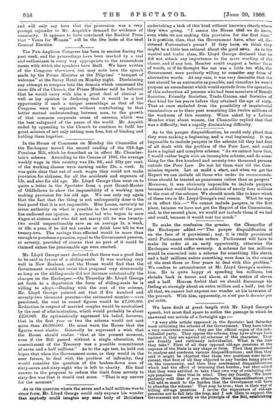In the House of Commons on Monday the Chancellor of
the Exchequer moved the second reading of the Old-Age Pensions Bill, which he described as in effect Mr. Chamber- lain's scheme. According to the Census of 1886, the average weekly wage in this country was 24s. 9d., and fifty per cent. of the *orking classes were earning under 25s. a week. It was quite clear that out of such wages they could not make Provision for siCkness, for all the accidents and expenses of Fie, and also for Old age. Mr. Lloyd George then went on to quote a letter in the Spectator from a past Grand-Master of Oddfellows tO show the impossibility of a working man making provision for his old age. We can only say again that the fact that the thing is not unfrequently done is the hest proof that it is not impossible. Miss Loane, certainly no mean authority on what is possible in the case of the poor, has endorsed our opinion. A normal lad who began to earn 'Wages at sixteen and who did not marry till he was twenty- two could unquestionably save on an average ls. a week, or 52s. a year, if he did not smoke or drink beer till he was twenty-two. The savings thus effected would be more than enough to purchase a pension, equal to the Government pension, at seventy, provided of course that no part of it could be claimed unless the pensionable age were reached.










































 Previous page
Previous page